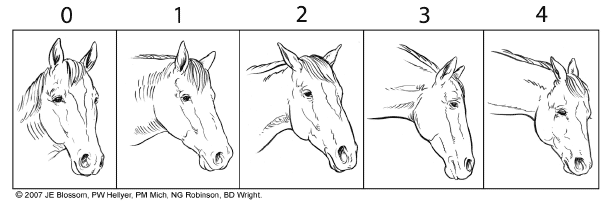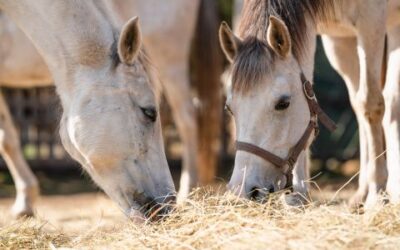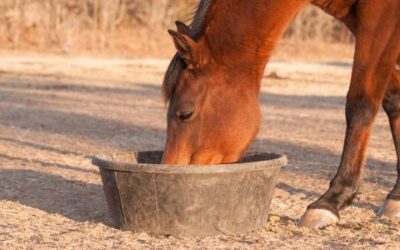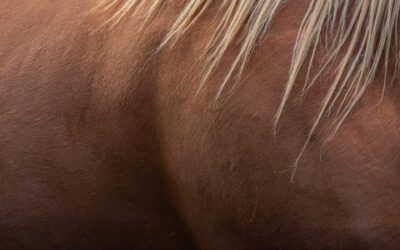Ongoing Studies Help Vets & Owners Listen to Their Horses
 “He is a very sweet horse,” said Erin Smith about her horse Guthrie in a Lucerne Farms Blog post about spinal manipulation. “but I can always tell when he is hurting.” Smith said Guthrie would drool when he was walking, or turn and nip at her when she was riding him or putting on the saddle. “I can also see the whites of his eyes, and I know he’s scared of being ‘forced’ to ride,” she said.
“He is a very sweet horse,” said Erin Smith about her horse Guthrie in a Lucerne Farms Blog post about spinal manipulation. “but I can always tell when he is hurting.” Smith said Guthrie would drool when he was walking, or turn and nip at her when she was riding him or putting on the saddle. “I can also see the whites of his eyes, and I know he’s scared of being ‘forced’ to ride,” she said.
Smith knows her horse well enough to recognize abnormal behavior that tells her something is wrong. Whether she realizes it or not, she is also engaging some of the latest equine pain evaluation techniques. Because horses don’t speak, we must interpret these signs and become armchair scientists ourselves in the field of equine pain. While nipping can be a more overt signal of discomfort, showing the whites of eyes and even more subtle changes in muscles of the mouth, for example, also transmit critical information about the level of pain a horse is experiencing.
The goal in identifying pain is to establish clear markers that can help vets, vet techs, trainers, and horse owners and farmers to better identify suffering. For owners like Smith, it can send up the flare that her horse needs attention from a professional. For vets, knowing to what extent pain is occurring and when, can help drive more effective therapies for managing pain. For farmers, it can mean moving toward more humane practices when it comes to castration and other routine procedures.
Toward Common Assessment of Equine Pain
HorseHead recently looked at work into new ways to determine equine pain that has been representative of the active research aiming to establish a foundation of reliable data in the field. Horses were scored on things like strained muscles in the mouth, and changes in the nostrils and ears as they were undergoing surgical procedures with and without pain medications and measured against a control group in which no procedure was performed. Researchers developed a protocol for assessing and measuring horse pain as interpreted through these facial expressions, setting a foundation of work in equine pain assessment. More recently, researchers engaged in recent studies in the UK, including Dr. Sue Dyson, who has been instrumental in facial recognition studies, have contributed to the body of emerging research by developing an ethogram for ridden horses, which provides a catalog of facial markers horses might display during riding to identify lameness and other types of pain.
 Each body part can display an expression that may be normal or reflect pain, conflict behavior, or distress, and today, thanks to research in this area, veterinarians are well versed in them. Tuning in to the horse’s ears, eyes, nose, muzzle, mouth, and head position can reveal sources of pain, the extent of pain, and help in evaluating changes over time — essential information for treatment and management. Caitlin Daly DVM of Mid Coast Equine, who treated Erin Smith’s horse Guthrie, shared with the Lucerne Farms Blog the importance of digging deeper into behaviors that may seem odd to an owner. “I strongly believe that if we listen close enough with our eyes, our patients will often tell us what’s wrong. But if we’re not looking, we’re not listening,” she said.
Each body part can display an expression that may be normal or reflect pain, conflict behavior, or distress, and today, thanks to research in this area, veterinarians are well versed in them. Tuning in to the horse’s ears, eyes, nose, muzzle, mouth, and head position can reveal sources of pain, the extent of pain, and help in evaluating changes over time — essential information for treatment and management. Caitlin Daly DVM of Mid Coast Equine, who treated Erin Smith’s horse Guthrie, shared with the Lucerne Farms Blog the importance of digging deeper into behaviors that may seem odd to an owner. “I strongly believe that if we listen close enough with our eyes, our patients will often tell us what’s wrong. But if we’re not looking, we’re not listening,” she said.
More studies into equine pain may make those complaints easier to hear.
Find a comprehensive list of Pain-associated Behaviors from TheHorse.com.
What is HorseHead?
Horse Head is part of Cayuse Communications, a family of websites that cater to horse enthusiasts. It provides articles that cover science-oriented articles on complicated topics and makes them easy to absorb and understand. Find articles on neuroscience, equine behavior and more at HorseHead.





